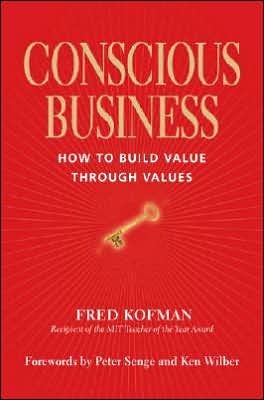I always enjoy reading business books, knowing that this must have been required reading for one of the Stern courses! Conscious Business by Fred Kofman, a former MIT faculty member, provided an outstanding read on building values driven organizations. Kofman’s book starts with introductions by some of the best educators in the field of organizations, Ken Wilbur and Peter Senge (one of my favorites!). Kofman presents strategies and examples of how organizations need to be driven by a set of values that respects and honor others. He weaves in great fables/stories that further illustrate his points. Kofman also presents real life examples that include dialogues (and even fixes them to further demonstrate how to better the conversations). He also shares stories taken from Jim Collins' Good to Great, an all-time favorite! Be conscious of your conversations and interactions with others is rule #1. The three dimensions of business: the task, the relationship, and the personal. He then explains the integral perspective of an organization: product (having), process (doing), and platform (being). Once you understand the process of business, one can then move to create conscious attitudes, which include: unconditional responsibility, essential integrity, ontological humility, conscious behaviors, authentic communication, constructive negotiation, impeccable coordination, conscious responses, and emotional mastery. Each chapter is one of the tenets listed above and the final chapter brings it all together by entering the market with helping hands. One of my favorite stories to illustrate his point occurs when he is on an airplane with his children and they suddenly jump out of their seats during the flight. Instead of yelling at them, he remembers, if we were to crash would I want my last memory to be yelling at my children. This reminds me of the simplistic thought of how we should treat people as we never know when our last moment will occur. He uses a great deal of Christian thinking and role models in his examples. He also quotes Victor Frankl (if you haven’t read his book on being in a concentration camp detainee in Nazi Germany, Man’s Quest for Meaning – ADD IT). Let me share one last great story that Kofman uses: A big tough samurai once went to see a little monk. “Monk”, he barked, in a voice accustomed to instant obedience, “teach me about heaven and hell!” The monk looked up in the mighty warriors and replied with utter disdain, “Teach you about heaven and hell? I couldn’t teach you about anything. You’re dumb. You’re dirty. You’re a disgrace, an embarrassment to the samurai class. Get out of my sight. I can’t stand you.” The samurai got furious. He shook, red in the face, speechless with rage. He pulled out his sword, and prepared to slay the monk. Looking straight into the samurai’s eyes the monk said softly, “That’s hell.” The samurai froze, realizing the compassion of the monk who had risked his life to show him hell! He put down his sword and fell to his knees, filled with gratitude. The monk said softly, “and that’s heaven.” Add this one to your list, especially those who work with groups!

No comments:
Post a Comment